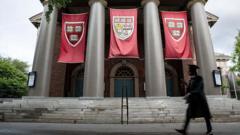In a dramatic political move, the Trump administration is positioned to evaluate approximately $100 million in funding to Harvard University, raising concerns about the impact on vital research projects.
Trump Administration Targets Harvard Funding: $100 Million at Stake

Trump Administration Targets Harvard Funding: $100 Million at Stake
The White House seeks to review and potentially redirect federal grants to Harvard University as conflict escalates.
The Trump administration's escalating battle with Harvard University has entered a critical phase, with federal agencies being directed to review contracts and grants estimated at $100 million. The Government Services Administration (GSA) is set to circulate a letter urging agencies to assess whether funding can be "canceled or redirected." This marks a continuation of past efforts where the administration froze billions in federal funding and attempted to curtail Harvard's ability to enroll international students.
Reportedly, 30 government contracts could be scrutinized as part of this initiative, as the administration accuses Harvard of discrimination and antisemitism. Harvard has yet to officially respond to the letter, but its officials highlight the reliance on federal funding for essential research aimed at combatting significant health challenges like cancer and heart disease.
Students and faculty, including Jacob Miller, a vocal critic of the administration's stance, assert that claims of addressing antisemitism with budget cuts lack credibility. Notably, proposed cuts would not affect affiliated hospitals, and agencies have the ability to advocate for critical grants deemed essential.
The history of conflict between the Trump administration and Harvard includes previous threats to its tax-exempt status and legal disputes surrounding the university's funding. Harvard President Alan Garber has emphasized the detrimental effects that cutting research funding could have, not just on Harvard, but also on the national research landscape.
For specific research initiatives like the Sinclair Lab at Harvard Medical School, which conducts crucial studies on aging and associated diseases, potential funding cuts could severely disrupt ongoing work. The lab's founder, David Sinclair, has voiced concerns about the far-reaching consequences that reduced funding could have on contributions from international scholars.
Experts, including Adam Nguyen, a Harvard alumnus, predict that the cuts will significantly impact graduate and PhD students reliant on external funding, potentially leading to layoffs and halted research projects. Overall, the situation indicates a volatile intersection of education, research, and political maneuvering as Harvard faces the possibility of losing crucial federal support.
Reportedly, 30 government contracts could be scrutinized as part of this initiative, as the administration accuses Harvard of discrimination and antisemitism. Harvard has yet to officially respond to the letter, but its officials highlight the reliance on federal funding for essential research aimed at combatting significant health challenges like cancer and heart disease.
Students and faculty, including Jacob Miller, a vocal critic of the administration's stance, assert that claims of addressing antisemitism with budget cuts lack credibility. Notably, proposed cuts would not affect affiliated hospitals, and agencies have the ability to advocate for critical grants deemed essential.
The history of conflict between the Trump administration and Harvard includes previous threats to its tax-exempt status and legal disputes surrounding the university's funding. Harvard President Alan Garber has emphasized the detrimental effects that cutting research funding could have, not just on Harvard, but also on the national research landscape.
For specific research initiatives like the Sinclair Lab at Harvard Medical School, which conducts crucial studies on aging and associated diseases, potential funding cuts could severely disrupt ongoing work. The lab's founder, David Sinclair, has voiced concerns about the far-reaching consequences that reduced funding could have on contributions from international scholars.
Experts, including Adam Nguyen, a Harvard alumnus, predict that the cuts will significantly impact graduate and PhD students reliant on external funding, potentially leading to layoffs and halted research projects. Overall, the situation indicates a volatile intersection of education, research, and political maneuvering as Harvard faces the possibility of losing crucial federal support.




















